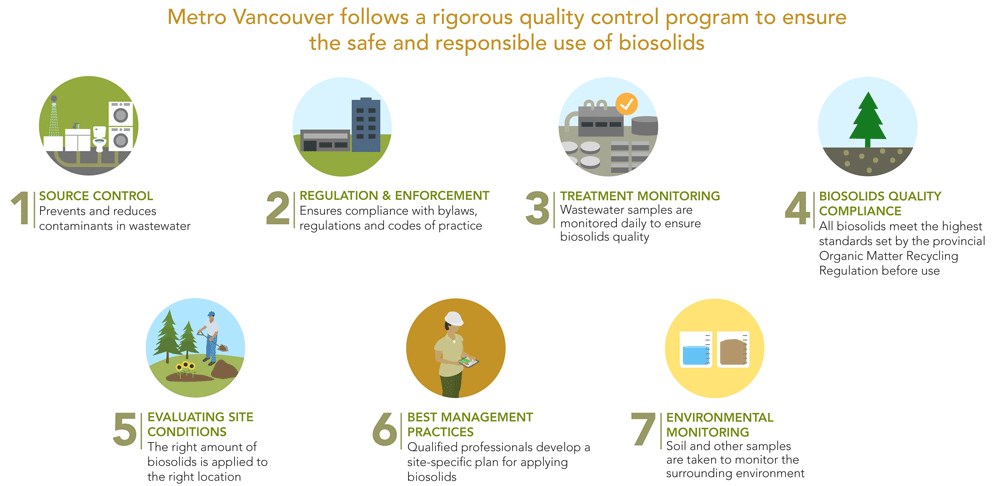A lot of science, testing and quality control goes into Nutrifor. It starts with the wastewater that goes into making Nutrifor and continues all the way to the land where Nutrifor is used.
Testing from start to finish
Metro Vancouver’s quality control process starts before Nutrifor is even created. Regional officers enforce bylaws and regulations that control what can be sent to wastewater treatment plants, reducing contaminants in wastewater.
At the treatment plant, Metro Vancouver tests the wastewater that will be turned into Nutrifor. Once Nutrifor has been produced, it is tested again before it leaves the plant. From the time it enters the treatment plant to the time it becomes the finished product that is Nutrifor, it will have been tested many times.

A plan for each site
When it’s time to use Nutrifor, qualified professionals test each site to determine its specific needs. We then work with qualified professionals to develop a plan that is tailored to that site. We submit plans, as required, to the Ministry of Environment and Parks and the Local Health Authority.
Going beyond regulatory requirements
The Organic Matter Recycling Regulation, developed by the Ministry of Environment and Parks and the Ministry of Health, governs how biosolids are made and used on land in BC and sets standards for quality. Metro Vancouver continuously tests the biosolids used in Nutrifor, performing thousands of tests every year. In 2024 we tested our biosolids over 13,000 times, ensuring that Nutrifor always meets or goes beyond Organic Matter Recycling Regulation requirements.
Contaminants of emerging concern
Biosolids can contain small amounts of other materials that come from products that most of us use every day, like medications, soaps and shampoos. The amounts found in Nutrifor are much lower than what is present in these everyday household products.
Research shows that the amount of these compounds in biosolids is so low that it would take multiple lifetimes of working or playing around biosolids to equal everyday exposure to many common products, such as antimicrobials found in soaps and toothpaste, flame retardants found in fabrics, and pain relief medication.
Metro Vancouver continues to monitor its wastewater and Nutrifor to better understand which compounds are present, and is participating in studies to better understand the impact of contaminants of emerging concern on human health and the environment.
Exposure to biosolids compared to use of common products

It would take many years of working or playing around biosolids or landscaping soil containing biosolids to equal exposure to many common products.